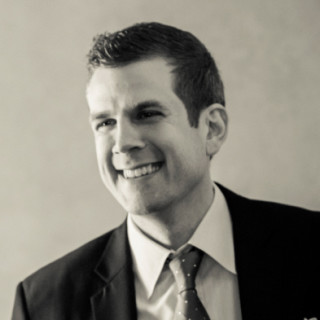 He sits in his favorite spot: a small bench alongside the back door. It’s a particularly sunny day, so the right side of his face is washed out by some unintentional iPhone cinematic magic. My son, Ben, is celebrating the beginning of his 16th month of life, with his mother filming him just after a pancake breakfast.
He sits in his favorite spot: a small bench alongside the back door. It’s a particularly sunny day, so the right side of his face is washed out by some unintentional iPhone cinematic magic. My son, Ben, is celebrating the beginning of his 16th month of life, with his mother filming him just after a pancake breakfast.
“Do you want to say hi to Daddy?” she asks him.
“Dada,” he replies excitedly.
“Do you miss Daddy?”
I’m not sure he understands the question entirely, but he nods affirmatively. I’m delighted to see him, even like this, but mildly disheartened to spend a Sunday morning away. Such is call.
The prognosis for this Anesthesiology resident is a good one. When the coronary artery bypass grafting (CABG) next door ends, first call will take over my room, and I’ll be biking home at light speed, before Ben even wakes up from his nap. He’ll be delighted by my presence, not knowing the difference between this and any other weekday.
The on-call Cardiac Surgery attending’s phone rings, as it does so often during cases. For every robocall that promises to save him money on open enrollment health insurance, there is another call regarding a dying inpatient or transfer. This call is the latter: a patient upstairs is on 36 of levo and 25 of epi, but still not able to maintain a blood pressure. The intensive care unit wants to put the patient on extracorporeal membrane oxygenation, which means my tenure here in the operating room for the next five hours is secured … sorry, Ben.
My patient is on cardiopulmonary bypass, leaving more of my mind-space free to roam than during induction or coming off pump. I ask myself: What is normal? For medicine, this is certainly normal. I knew that when I was getting in, and the rewards I receive are indubitably worth the times like these, even during this gauntlet of residency. The separation from my family, and the captivity in hospital, are always far worse in the moment than in retrospect. But still, I think about the masses spending Sunday morning together. I reflect on sleeping in and waking up to babbling on the monitor. As I pursue these roaming thought threads, I look over the curtain at the Cardiac Surgery residents and fellows … and I feel like a slacker. While they are on call for the entirety of the weekend, sometimes operating for 48 hours at a stretch, I’m waiting for my “relief,” a word that is not part of their lexicon. While I have been out for a bathroom and lunch break, they have been sweating, truly captive, unable to scratch that itch on their head or send a message home. When the pump run begins and I catch up on charting, they are just getting started with the extremely technically demanding phase of the procedure. My contemporary has two kids, and he hasn’t seen them in days. Between Thursday’s CABGs, overnight lung transplants, and Friday’s thoracoabdominal aortic aneurysm repair, he hasn’t seen his wife, let alone a plate of real food, in some time.
My 68-hour work week is not soul-crushing; it affords me an opportunity to get better at what I do every day, and also be there for my family. No one wants to be taken care of by a doctor who skirted by with the minimum amount of training. Patients are putting their trust in us, their lives in our hands, and we owe it to the public at large to be great physicians. It seems there is no way to attain this level of greatness, or at least clinical competence, without working a lot of hours. We want to be thrust into uncomfortable, uncommon, and difficult situations as often as possible while residents, so when things go awry and we are on our own, we can call upon our training to get patients through such situations.
When it comes to deciding what level of self-sacrifice is right for us, we are left to our own devices. Sometimes our values can get skewed, and we end up getting pulled too far to one end of the spectrum. Burnout can force us to decelerate and simply go through the motions, while the desire to improve and succeed can make us turn a blind eye to other important pillars of our lives. Even at times when we are merely treading water, even when the nonclinical tasks of life are piling up in the background, we must constantly revisit what we’re doing, and ensure it’s congruent with our values and true desires. If we don’t make these decisions and set limits, someone else will make them for us. For now, we will keep drinking coffee, putting in the hours to save our brethren, and asking the closest people in our lives for a modicum of understanding — sprinkled with the occasional beseeching plea for forgiveness. For this, we must thank them.
Austin Perlmutter, MD is an Internal Medicine physician based in Portland, Oregon. His current focuses are exploring methods of creating sustainable joy, health, and meaning in the modern world, as well as how to improve wellness for those in the medical field. Austin reports no conflicts of interest.
Image by Tex vector/ Shutterstock







